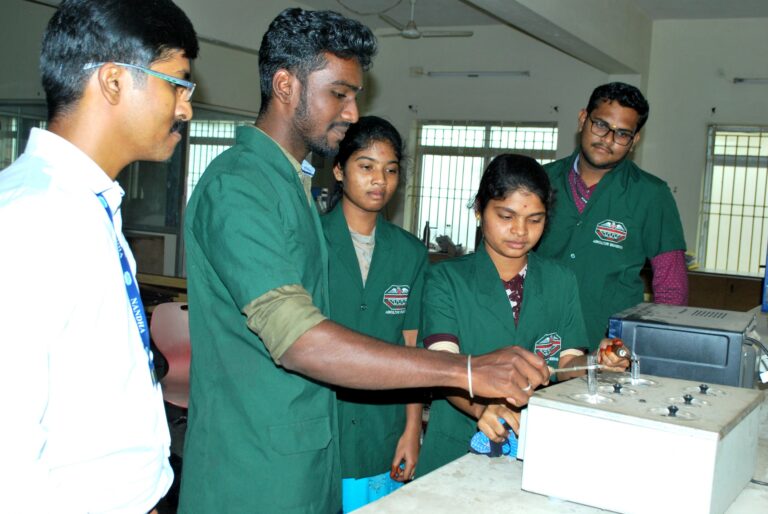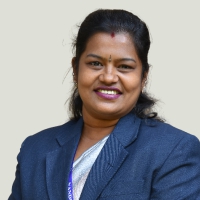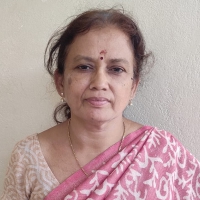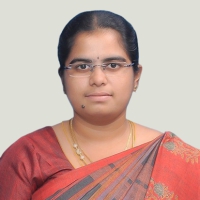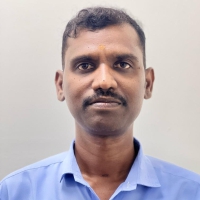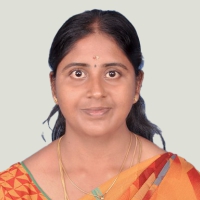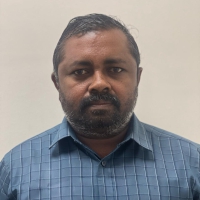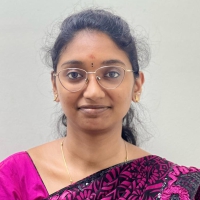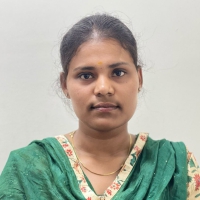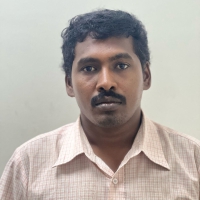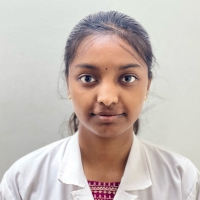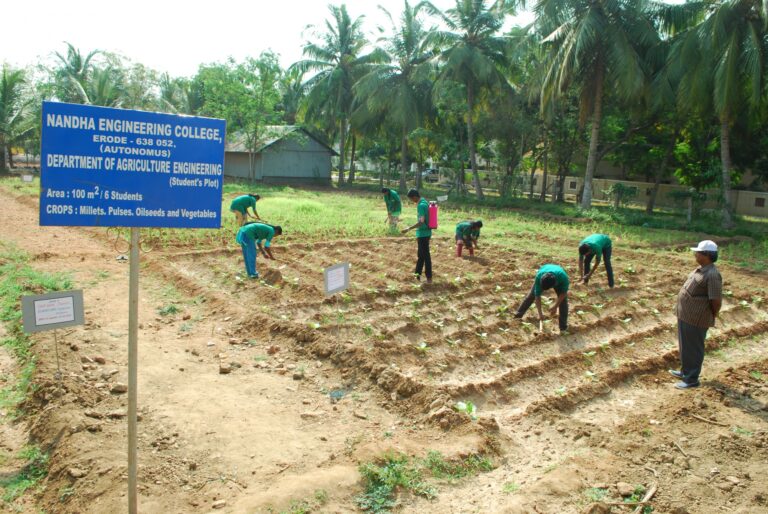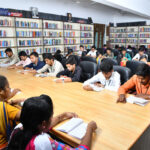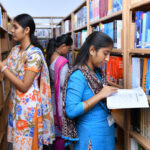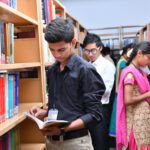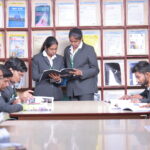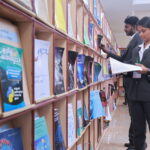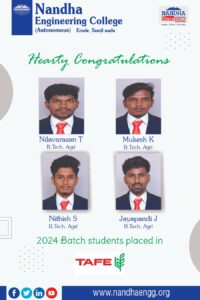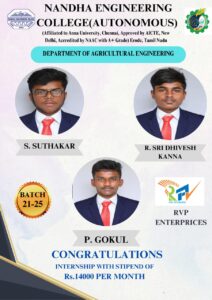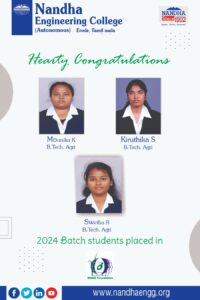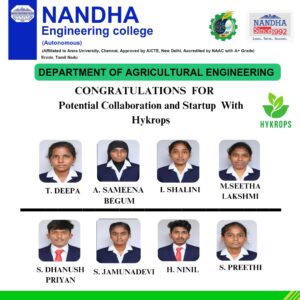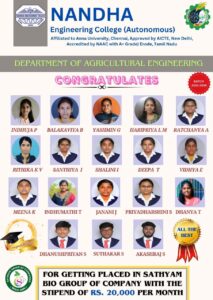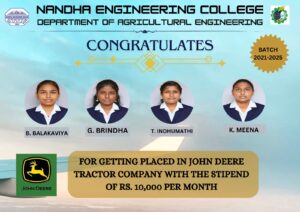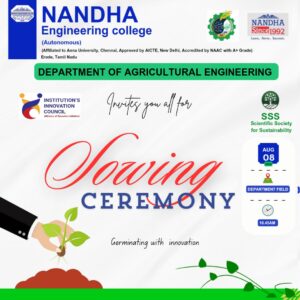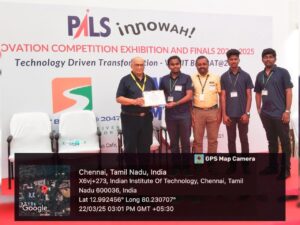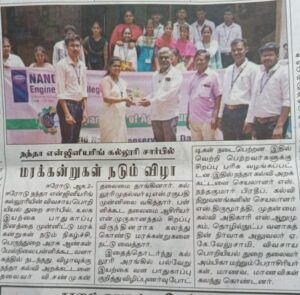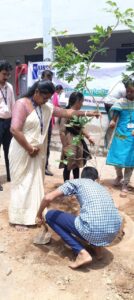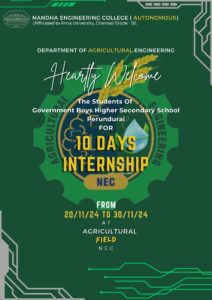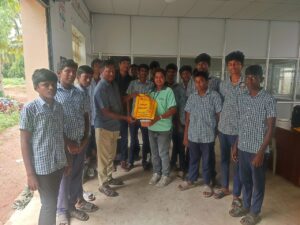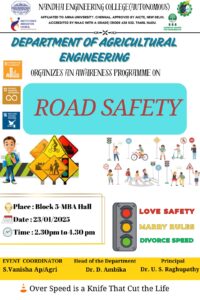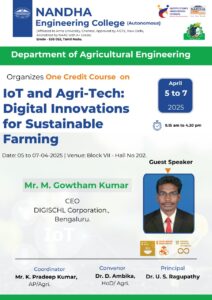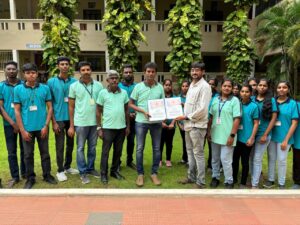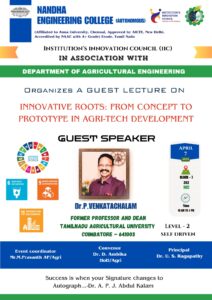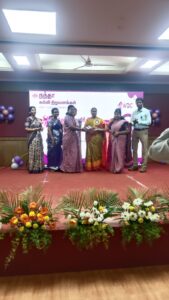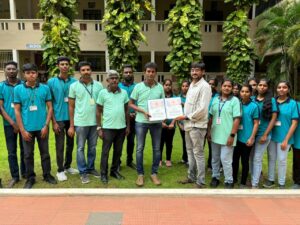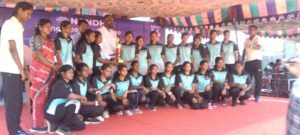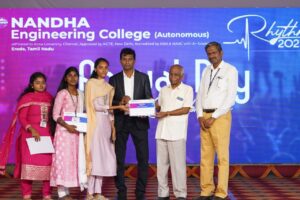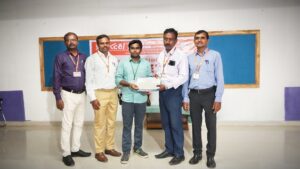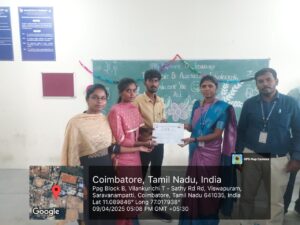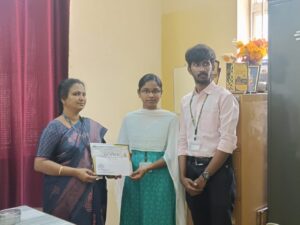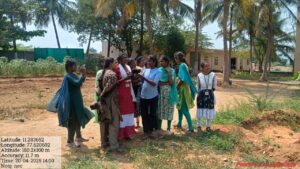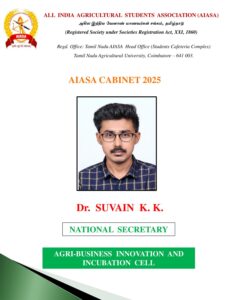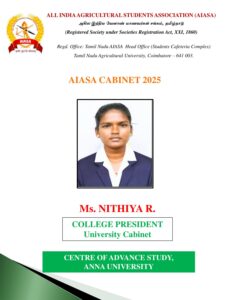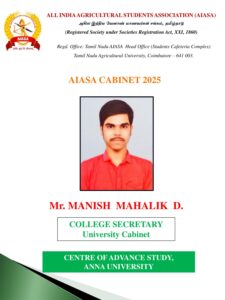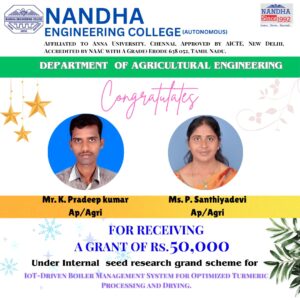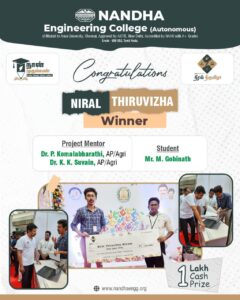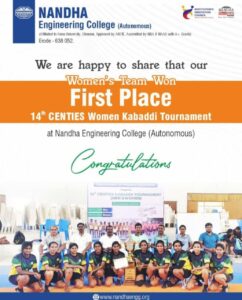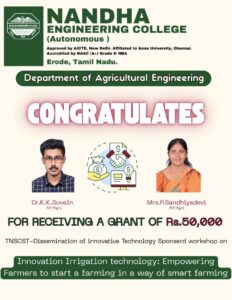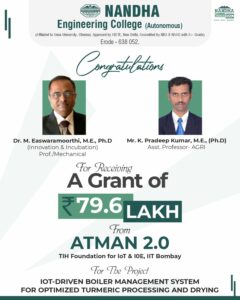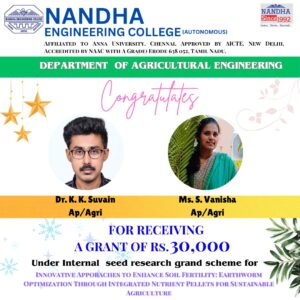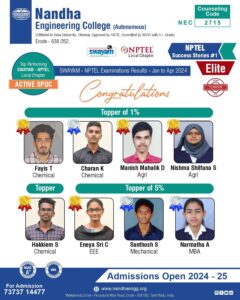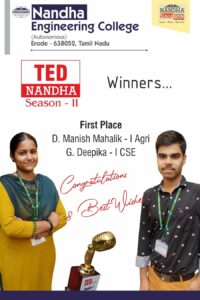
Head of the Department
Programme Offered
B.E Agricultural Engineering
Intake - 60
About the Department
The Department of Agricultural Engineering was established in 2017 with an intake of 60 students and the current intake of the students remains the same. The department has well-qualified faculty members with expertise in different disciplines like Renewable Energy, Land and Water Management, Food Processing, Agronomy, etc. This program offers a comprehensive knowledge of engineering applications in agriculture, encompassing both conceptual field applications and the curriculum comprises various courses such as basic agriculture, basic engineering, soil and water conservation, farm machinery and power, food processing, and renewable energy.
The department is associated with the professional bodies like ISTE, ISAE, and SSS which plays a significant role in enriching the quality of the curriculum. The program provides opportunity to the students to excel in all the fields and also helps them to transform into young entrepreneurs. The department possesses 11 granted design patents and has published 45 Research articles in various fields.
Guest lectures and industrial visits are periodically arranged for the students to enhance their technical knowledge. The department strives for all-round excellence in students, encouraging them in all co curricular and extracurricular activities.
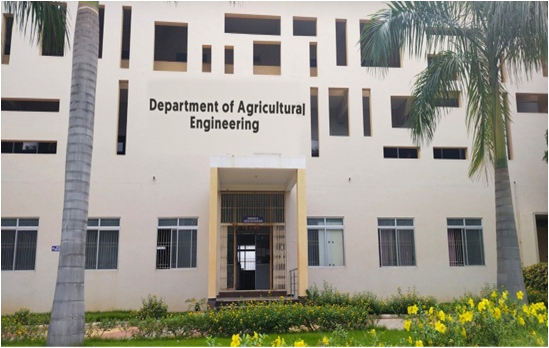
VISION
To foster academic excellence by imparting knowledge in Agricultural Engineering to meet the ever-growing needs of the society.
MISSION
Department of Agricultural Engineering is committed
- To provide quality education to produce agricultural engineers with social responsibility
- To excel in the thrust areas of agricultural engineering to identify and solve the real-world problems.
- To create a learner-centric environment by upgrading knowledge and skills to cater the needs and challenges of the society.
PROGRAM EDUCATIONAL OBJECTIVES (PEOs)
Program Educational Objectives are broad statements that describe the career and professional accomplishments that the program is preparing graduates to achieve
The graduates of Agricultural Engineers after 3 to 5 years will be.
PEO1: Core Competency: Successful professional with core competency and inter-disciplinary skills to satisfy the Industrial needs.
PEO2: Research, Innovation and Life-long Learning: Capable of identifying technological requirements for the society and providing innovative solutions to real time problems.
PEO3: Ethics, Human values, and Entrepreneurship: Able to demonstrate ethical practices and managerial skills through continuous learning.
Program Outcomes are statements that describe what students are expected to know and be able to do upon graduating from the program. These relate to the skills, knowledge, attitude and behaviour that students acquire through the program.
PO 1: Engineering Knowledge: Apply the knowledge of mathematics, science, engineering fundamentals, and an engineering specialization to the solution of complex engineering problems.
PO 2: Problem Analysis: Identify, formulate, review research literature, and analyze complex engineering problems reaching substantiated conclusions using first principles of mathematics, natural sciences, and engineering sciences.
PO 3: Design / Development of solutions: Design solutions for complex engineering problems and design system components or processes that meet the specified needs with appropriate consideration for the public health and safety and the cultural, societal, and environmental considerations.
PO 4: A Conduct Investigations of Complex Problems: Use research-based knowledge and research methods including design of experiments, analysis and interpretation of data,and synthesis of the information to provide valid conclusions.
PO 5: Modern Tool Usage: Create, select, and apply appropriate techniques, resources,and modern engineering and IT tools including prediction and modeling to complex engineering activities with an understanding of the limitations.
PO 6: The Engineer and Society: Apply reasoning informed by the contextual knowledge to assess societal, health, safety, legal and cultural issues and the consequent responsibilities relevant to the professional engineering practice.
PO 7: Environment and Sustainability: Understand the impact of the professional engineering solutions in societal and environmental contexts, and demonstrate the knowledge of, and need for sustainable development.
PO 8: Ethics: Apply ethical principles and commit to professional ethics and responsibilities and norms of the engineering practice.
PO 9: Individual and Team Work: Function effectively as an individual and as a member or leader in diverse teams and in multidisciplinary settings.
PO 10: Communication: Communicate effectively on complex engineering activities with the engineering community and with society at large, such as, being able to comprehend and write effective reports and design documentation, make effective presentations, and give and receive clear instructions.
PO 11: Project Management and Finance: Demonstrate knowledge and understanding of the engineering and management principles and apply these to one’s own work, as a member and leader in a team, to manage projects and in multidisciplinary environments.
PO 12: Life-long Learning: Recognize the need for, and have the preparation and ability to engage in independent and life-long learning in the broadest context of technological change.
Program Specific Outcomes (PSOs) refer to the specific abilities, knowledge, skills, and attributes that graduates are expected to possess upon completing a particular academic program or course of study
The students of Agricultural Engineering will be able to
PSO1: Design, analyze and apply the knowledge gained on agricultural machinery, tools, implements and production technologies to increase crop production, improve land use, soil nutrient and conserve resources like water, fertilizer, and energy.
PSO2: Apply the comprehensive knowledge of engineering properties of agricultural products for upgrading the unit operation and developing innovative process, value-added products, and advanced engineering technologies to meet the challenges in agriculture
| S.no | Name of the MoU Company | MoU Signed Date | No. of Year Valid | Name of the Activity | PO/ PSO |
|---|---|---|---|---|---|
| 1 | Sai Irrigation Erode |
30.09.2023 | 5 | Workshops, Local Visit | PO1, PO2, PO3, PO4 PO5, PO8, PO9, PO10 |
| 2 | Mobitech Wireless Solutions pvt ltd Erode |
31.07.2023 | 5 | Internship, Placement, Local Visit | PO1, PO2, PO3, PO4, PO5, PO9, PO10, PO11 |
| 3 | Universal Power Supplies Bangalore |
24.11.2022 | 5 | Internship, Placement, Local Visit, Guest Lecture | PO1, PO2, PO3, PO5, PO9, PO10 |
| 4 | Roots Irrigation Private Ltd, Coimbatore |
13.01.2022 | 5 | Internship, Placement | PO1, PO2, PO3, PO5, PO9, PO10 |
| 5 | Escorts Training and Development Centre, Bangalore |
14.02.2020 | 5 | Internship, Placement | PO1, PO2, PO3, PO5, PO9, PO10 |
| No. | Reference No. | Client Name | Address | Project Domain | Project Estimation | Cost of the Project | Project Coordinators | Project Start Date | Project Completion Date |
| 1 | 2024/25/Agri/Consultancy/01 | M/S S.K.Constructions | Sathyamangalam,Erode | Soil and Water Conservation | 62250 | 62250 | D.Ambika R.Sridharshini S.Vanisha | 20.02.25 | 20.02.25 |
| 2 | 2024/25/Agri/Consultancy/02 | Junior Engineer Anthiyur Town Panchayat Erode | Anthiyur Erode | Third Party Inspection-Material testing | 15000 | 15000 | Dr.E.K.Mohanraj Mr.K.L.Ravishankar Mr.K.Pradeep Kumar | 24.02.2025 | 28.02.2025 |
| Research and Development | |||||||||
| Ongoing Research Projects | |||||||||
| S.no | Reference no | Faculty Name | Project Title | Funding Agency | Seed Money Received (Amount) | Project Start Date | Project Completion Date(Tentative) | ||
| 1 | NEC/R&D/CFIR/2024-25/Seed Grant/Project 2 | Dr. Suvain K. K., Dr. T. Jayanalina, Ms. S. Vanisha | Innovative Approaches to Enhance Soil Fertility: Earthworm Optimization through Integrated Nutrient pellets for Sustainable Agriculture | Nandha Engineering College | 30,000/- | 01.02.2025 | 28.05.2026 | ||
| 2 | NEC/R&D/CFIR/2024-25/SEED Grand/ Project 09 | Dr. M. Easwaramoorthi Mr. K. Pradeep Kumar Ms. P. Sandhiyadevi | IoT-Driven Boiler Management System for Optimized Turmeric Processing and Drying | Nandha Engineering College | 50,000/- | 19.12.2024 | 05.01.2025 | ||
| 3 | NEC/R&D/CFIR/2024-25/SEED Grand/phase -2 / Project 02 | Mr. K. Pradeep Kumar Ms. P. Sandhiyadevi | In-Situ monitoring of high-quality biochar formation with optimized thermal degradation biomass in automated bioreactors for small scale jaggary production unit | Nandha Engineering College | 50,000/- | 24.03.2025 | 01.03.2026 | ||
| 4 | NEC/R&D/CFIR/2024-25/Seed Grant/Project 3 | Mr.V.Chandramohan Mr.K.Anandhu Mr.R.Thiruneelakandan | Completely biodegradable organic pots and idols | Nandha Engineering College | 20,000/- | 01.02.2025 | 31.05.2025 | ||
| Grants Received From External Sources(FDP/Seminar/Workshop) | |||||||||
| S.no | Reference No | Faculty Name | FDP/Seminar/Workshop | Title | Funding Agency | Amount Received | Program Date | Invitation | Photo |
| 1 | AICTE/ATAL/2024 | Dr.D,Ambika & Dr.K.K.Suvain | FDP | Innovative Approaches to Energy, Sustainability and Climate Resilience: Teaching and Research Strategies for a Greener Future | AICTE | 1,00,000.00 | 16.12.24 to 21.12.24 | 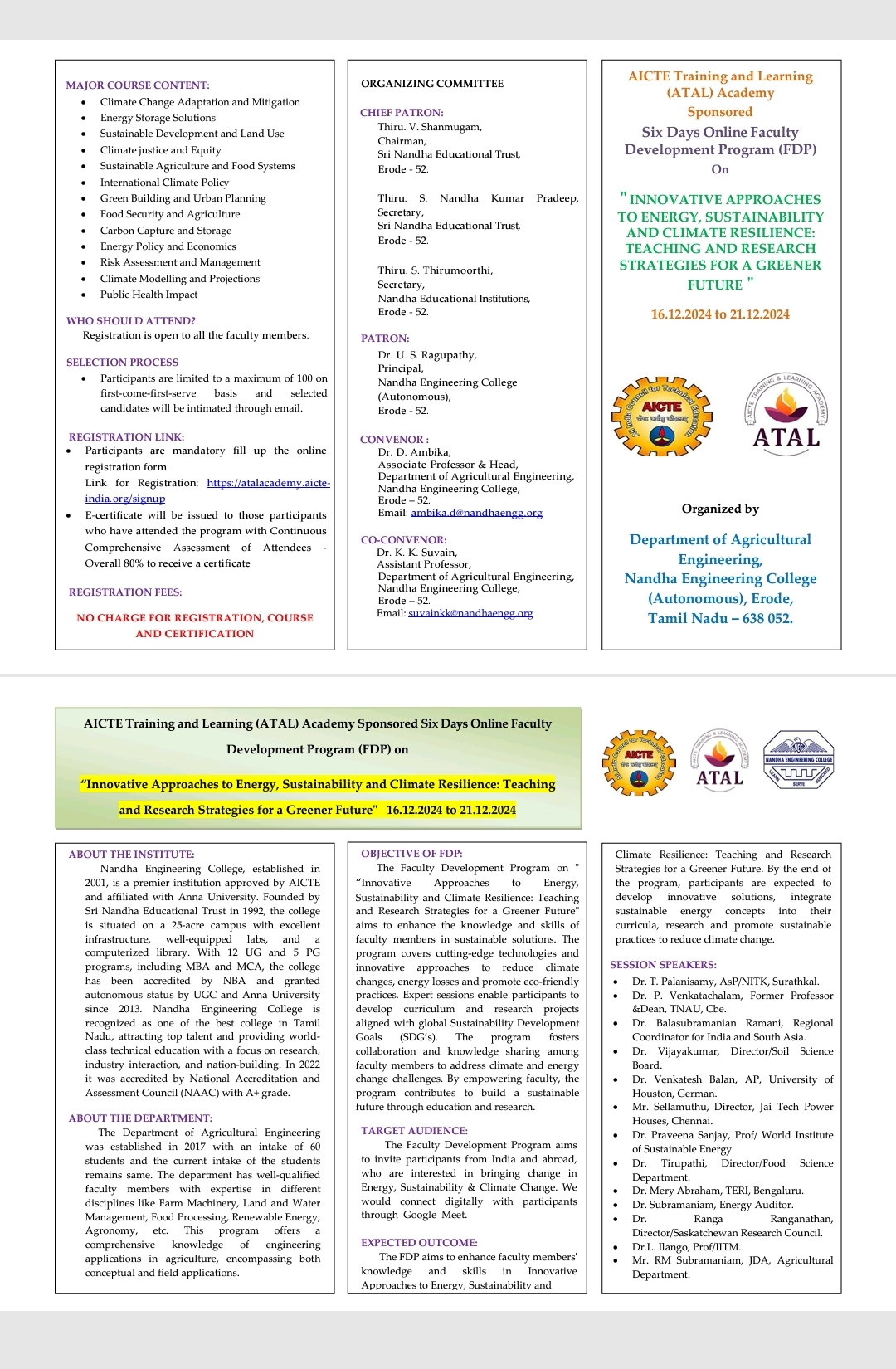 |  |
| 2 | TNSCST/DIT/MK/2022-23/02 | Dr. Suvain K. K. & Ms. P. Sandhiyadevi | Workshop | Innovation in Irrigation Technology: Empowering farmers to start farming in a way of smart farming | TNSCST | 50,000/- | Tentatively by May third week | ||
Supporting Staff Members
Department Laboratory
SOIL SCIENCE AND ENGINEERING LABORATORY
Soil science laboratory helps the students to obtain adequate knowledge in accessing both physical and engineering behavior of soils through laboratory test tube procedures. This lab is equipped with various equipment to test the soil quality.
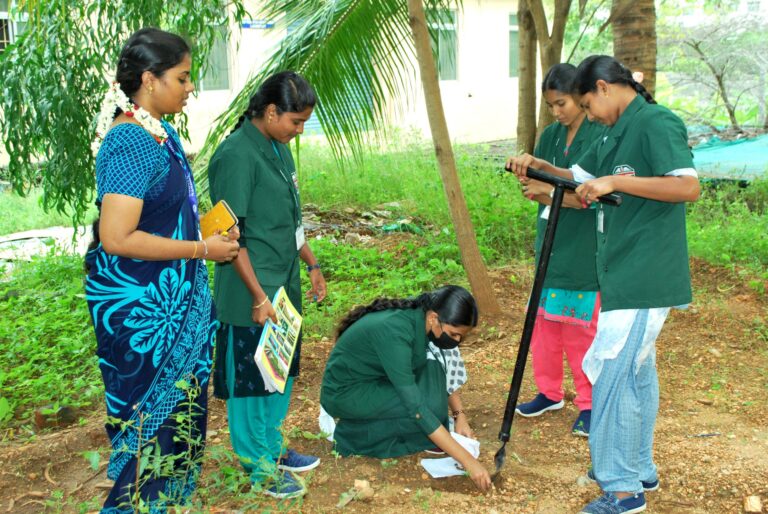
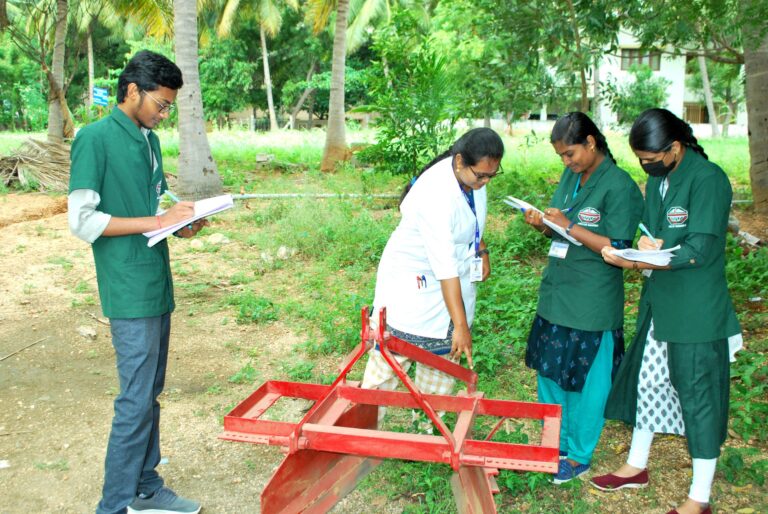
FARM IMPLEMENT AND EQUIPMENT LABORATORY
Farm implements and equipment play a very important role in agricultural operations. Their availability makes the work much easier and faster. The lab is equipped with tillage, land preparation, sowing, weeding, and fertilizer equipment, where students undergo agricultural practices to increase the production and productivity of different crops through farm mechanization.
FARM TRACTORS AND ENGINES LABORATORY
A farm tractor is a vehicle designed and used primarily in agricultural operations for drawing or operating other farm machines, equipment, and implements of husbandry. The lab is equipped with farm tractors and engines that help students understand the basic engine operating systems, tractor operation, and maintenance practices.
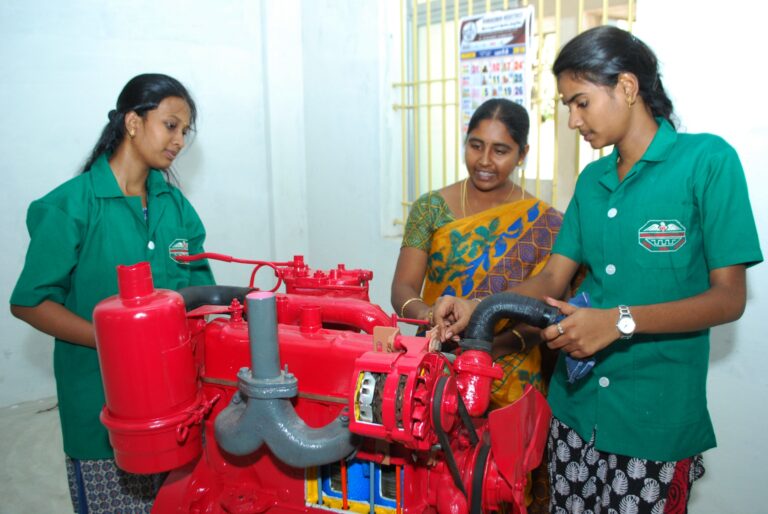
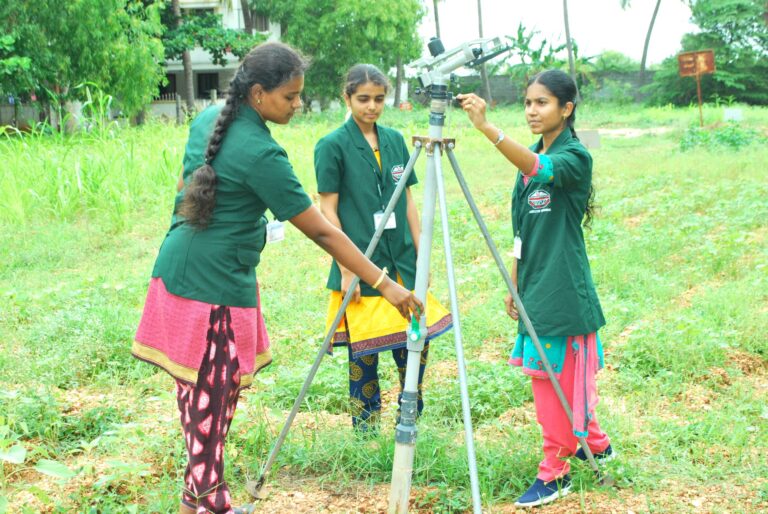
IRRIGATION AND DRAINAGE ENGINEERING LABORATORY
The irrigation and drainage laboratory in agricultural engineering educates students in the field of open channel and ground water in combination with engineering principles and to understand soil, water and plant relationship. And how they can be applied to better manage surface and ground water resources. And also provide such kind of facilities for agricultural engineers to measure the basic data required for planning and designing of different irrigation projects.
CROP PROCESS ENGINEERING LABORATORY
In crop process engineering, all operations are carried out after the harvesting of food and industrial crops. The lab enables the students to understand the processing technology of various agricultural products including cereals, pulses, oilseeds, fruits, vegetables, and animal products.
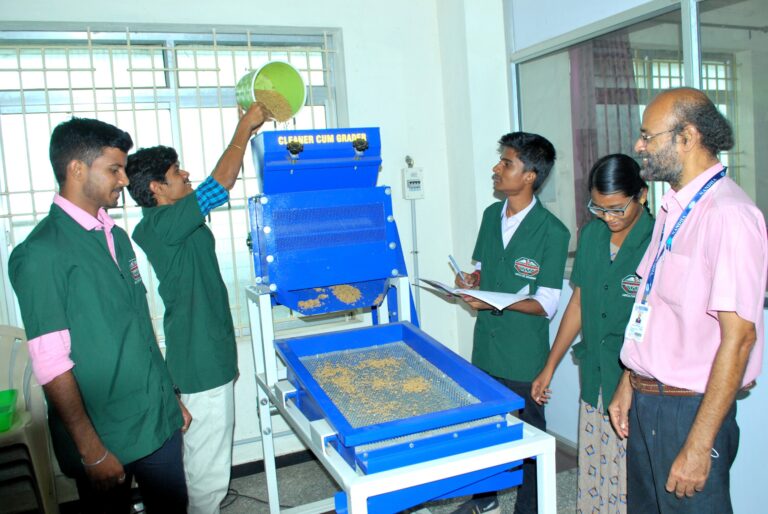
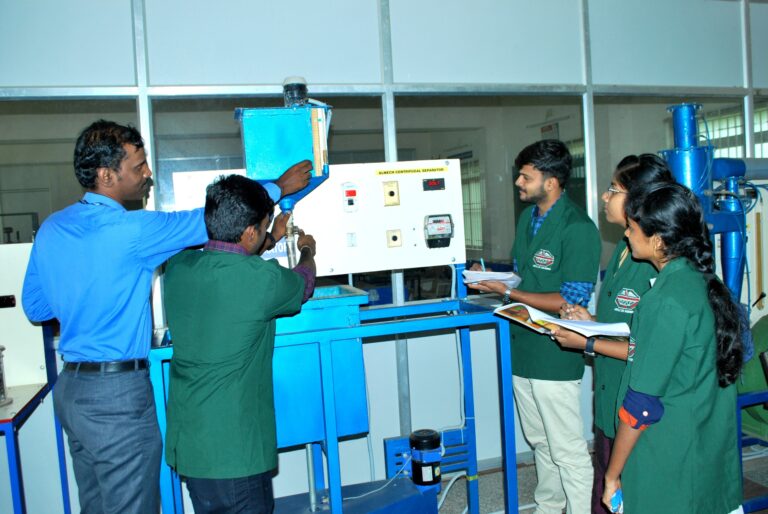
UNIT OPERATIONS LABORATORY
The laboratory is well equipped with the various types of mills and seperators. Guidance is provided to the students by a team of expert faculty and lab technicians. Students are supported to create innovative ideas to develop modern mills.
FOOD AND DAIRY ENGINEERING LABORATORY
Food and dairy laboratory support regulatory analysis of food and agro products. The laboratory equipped to analyze the physico-chemical characteristics of food materials including raw materials and finished products which helps the agricultural engineers to gain a broad-spectrum knowledge on processing of food materials and testing of samples.
